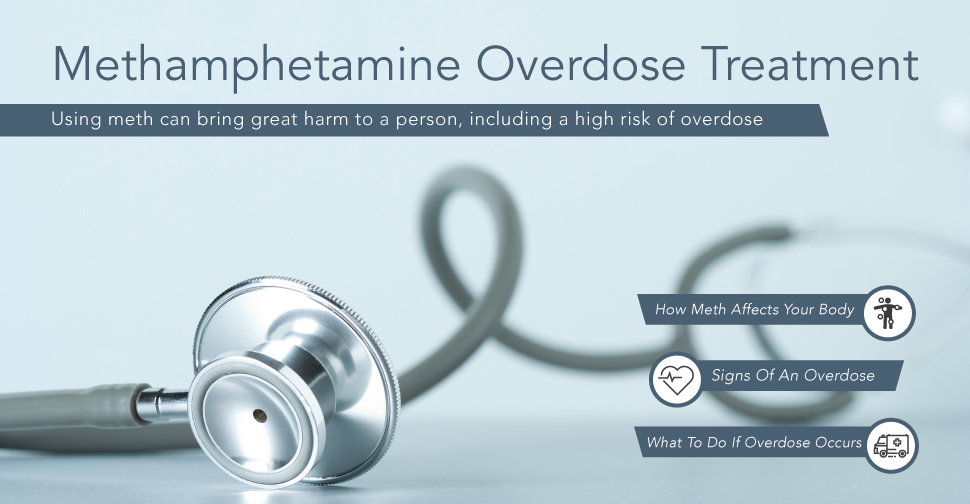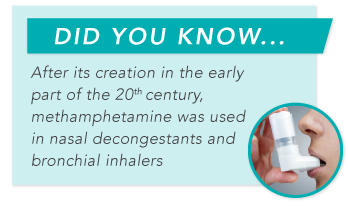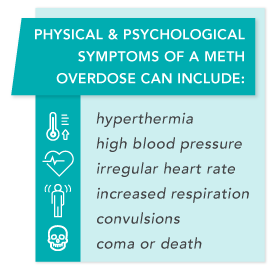
Methamphetamine, commonly referred to as meth, among other street names, has become increasingly widespread, as its prevalence has extended across the United States within the past several decades. With this diaspora, a continued pattern of abuse, addiction, and destruction has followed.
Meth is a highly addictive stimulant drug. Using this drug, either for the first time, or habitually, as is characteristic of an addiction, can bring great harm to a person, including a high risk of overdose.
Meth’s Background
You may be surprised to know that meth owes its roots to the medical field. Like many illicit drugs, meth was developed for medical purposes, and is yet used, albeit rarely for medical applications. After its creation in the early part of the 20th century, methamphetamine was used in nasal decongestants and bronchial inhalers, as explained by the National Institute on Drug Abuse (NIDA). Currently, in the now infrequent times it is used within the medical field, NIDA tells us that it is administered for ADHD or weight-loss treatments.

In order to better understand its potency and addictive potential, it is useful to consider the fact that it is very closely related to another powerful, and also commonly abused stimulant—amphetamine. In fact, according to the Center for Substance Abuse Research, meth, like amphetamine are both within the amphetamines class of drugs. Due to its strong risk for abuse and dependence, it is classified by the DEA as a Schedule II drug.
How Meth Affects Your Body
People may choose to administer meth several ways, each of which alter the effects and risks a meth abuser incurs. Meth, like various other illicit stimulant drugs, may be smoked, snorted, injected, or more rarely, taken orally. Each of these ways exposes a person towards to the potential of overdose, which in some cases, may be fatal.
Before we speak of this risk, and the subsequent treatment, we will speak in brief of the drug’s effects on a user. Being able to understand the signs and symptoms of meth abuse and addiction may give you a greater awareness that could be helpful towards initiating the help that may avert an overdose in someone you love. Prevention is key in protecting someone from use that accelerates from abuse to addiction, and subsequently the attributed risks. When someone uses meth, they may, in the short term:
- Become excessively talkative
- Exhibit a more focused state of attention
- Experience decreased fatigue
- Have a diminished appetite
- Exhibit signs of increased respiration (taking breaths in a greater frequency or speed)
- Complain that their heart rate is rapid
- Become too hot (hyperthermia)
As with any drug of abuse, as use progresses, a person is apt to exhibit more serious effects, with meth, these long-term signs of abuse may be:
- Tolerance (a person needs more to achieve the same effect)
- Anxiety
- A confused state
- Mood changes, including violent behavior
- Psychotic tendencies (paranoia, and seeing or hearing things that aren’t there)
- Believing that bugs are crawling on, or beneath the skin
- Intense itching or damage to the skin from the above notion
- Significant weight loss
- “Meth mouth,” a variety of dental issues due to the drug’s damaging effects
- Marks from needle use
- Infections at injection sites
- Wearing long sleeves to cover up the latter two signs

In addition to these symptoms of use, meth can also damage a person’s physical and mental health, including an increased risk of various transmissible diseases, including HIV and hepatitis C and B; cognitive decline, complications during pregnancy, and damage to the heart, to name some. Two of the greatest risks are addiction and overdose.
Signs Of An Overdose
If the above signs become apparent in someone close to you, and you believe there may be concern of meth abuse, or addiction, seek treatment immediately—it may mean the difference between an overdose occurring down the road, and even life and death. Being preemptive may help a person to avoid such dire circumstances if their drug use continues unchecked.
Unfortunately, people’s drug habits are not always caught in time, and an overdose may still occur. There are even more imminent signs that may further point to more serious straits, such as those which precede an overdose. As extracted from MedlinePlus, if a person has consumed large amounts of meth, such as that which may cause overdose, they may exhibit or experience the following:
 Agitation
Agitation- Chest pain
- Coma or unresponsiveness (in extreme cases)
- Heart attack
- Irregular or stopped heartbeat
- Difficulty breathing
- Very high body temperature
- Kidney damage and possibly kidney failure
- Paranoia
- Seizures
- Severe stomach pain
- Stroke
Please, we urge you, if you witness any of these conditions call emergency medical assistance immediately, your call has the potential to save a person’s life. Should you even begin to think that a meth overdose may be occurring, or that a person even be at risk of experiencing one, seek medical attention immediately. In these critical conditions, every minute manners, and the sooner you get your loved one, or yourself help, the sooner a medical intervention can work towards improving the odds that it does not result in a fatality.
As these individuals may become violent or aggressive please proceed with caution around them. If a person is seizing, do not attempt to hold down their limbs, or attempt in any other way to stop the movement. Instead, if they are experiencing a seizure, the only thing you should do is to lightly cradle their head, to help protect it from harm. If you are able, roll them off their back and onto their side, preferably the left, so that they don’t aspirate their vomit should they get sick.
Lastly, MedlinePlus urges that if you witness an overdose, to prepare crucial information for the medical support team, as much as you may know, including:
- How much they weigh and also their age.
- What amount of drug did they take, and in what frequency?
- How did they administer the drug? Did they inject it, take it orally, etc?
- When did they take the drug?
Also, if the person took any other drug(s), either prescribed or illicit, including alcohol, please make certain to tell the responders this, as this may change the course of treatment. This can be a very overwhelming and frightening situation, but remember, try to keep your head clear and stay calm so that you may assist them in getting the help they need.
Should An Overdose Occur
Again, we must remind you that a person may conceivably overdose on meth the first time they try it, or at any point along the spectrum between abuse and addiction. When this overdose happens suddenly, it is called an acute methamphetamine intoxication. In an instance that an overdose does occur, what follows are measures of treatment that will be initiated in an attempt to moderate the severity of various facets of the overdose in attempt to save the person’s life.
Foremost, when a person is overdosing on meth, due to the at times extreme impact that it can have on a person’s psyche, the medical staff will ascertain a person’s psychological standing. Within this period of time, they will also be establishing a person’s vitals. In most severe cases, a person’s mental state may be evident as extreme psychosis manifests by delusions, hallucinations, and paranoia. This is often accompanied by aggressive or violent behavior.
For the safety of both the individual and hospital staff, in these cases, the person will likely be restrained and sedated intravenously. This not only protects all parties involved, but allows for the emergency department (ED) team better, unobstructed access to be able to administer critical, and what could be lifesaving, measures. A Medscape article specifies on medicines that may be used, nothing that “Benzodiazepines diminish methamphetamine-induced behavioral and psychiatric intoxication. This class of drug is also used to terminate methamphetamine-induced seizures.”
Another medication-based approach that may be used is also outlined by Medscape, “Treat hyperactive or agitated patients with droperidol or haloperidol, which are butyrophenones that antagonize CNS dopamine receptors and mitigate the excess dopamine produced from methamphetamine toxicity.” However, they do note that despite the clinical success of these drugs in studies, some places will not use them because of a Black Box warning due to the cardiac risks of “QT prolongation and the potential for torsades de pointes.”
Within this process, as soon as they’re able, the medical staff will do a toxicology screening to confirm the presence of any other drugs that were reported and to identify any that were not. A person may also be intubated so that they can receive oxygen and breathing support through the aid of a machine.
Currently, meth, like many other stimulants has no FDA-approved treatment for addiction. Similarly, because of its stimulant nature, medical means to treat meth overdose varies from other approaches that use overdose-reversal drugs. For this reason, when a person encounters a meth overdose, the emergency department instead focuses their predominant attention on treating the physical and psychological symptoms of the meth overdose instead of an actual reversal of the drug itself.
At this point, once the situation is under control, the ED staff will begin assessing a person’s vitals more completely to determine the next measures of medical attention. As we noted above, meth may cause a person’s temperature to rise to sometimes drastic heights, a condition that is called hyperthermia. Combined with other risks—high blood pressure, increased or irregular heart rate, increased respiration, and convulsions, a person is at risk of losing their life.
To counter these risks, as explained by The Endowment for Human Development, a person may receive anticonvulsant drugs or be put into an ice bath to cool down their internal temperature. Hyperthermia may impact not only a person’s body, but also their brain, causing their brain’s temperature to rise to the point great damage may occur.
A U.S. National Library of Medicine published study on meth overdose chronicles the danger that this may have, citing that “we demonstrate that acute METH intoxication induces robust, widespread but structure-specific leakage of the BBB, acute glial activation, and increased water content (edema).” The piece continues to say that they are uncertain if these conditions may be reversed, however, that they do know that they contribute to “multiple functional and structural perturbations in the brain, determining its acute toxicity and possibly contributing to neurotoxicity.” Essentially, this means that a meth overdose may lead to brain damage. Hence, it is critical that a person receive care, so that their body and brain can begin cooling as soon as possible to advert as many aspects of damage as possible.
If a person has taken meth orally, MedlinePlus tells us they may receive a laxative and activated charcoal. These help to pass the toxins and cleanse them from a person’s system in a quicker manner than their body would on its own, in order to avoid the drug continuing to wreak havoc.
Once a person is more stabilized and the most imminent risks addressed, other medical tests and procedures may occur to determine the full extent of the damage, so that they may continue to administer even more focused medical care on other serious risks. These may include, as cited from MedlinePlus:
- Chest x-ray
- CT (computerized tomography) scan (a type of advanced imaging) of the head, if head injury is suspected
- EKG (electrocardiogram, or heart tracing)
- Other medicines or treatments for heart, brain, muscle and kidney complications
In addition to these measures, a person may receive various other drugs or treatments. As we’ve noted, meth abuse—especially in the larger amounts that would precipitate an overdose—can cause anxiety, agitation, nausea, high blood pressure, and even pain. Once a person’s state is evaluated for these concerns, they may receive a variety of medicines via an IV to address these conditions.
After a person recuperates from this event, they should seek treatment for meth abuse or addiction, in order to further protect themselves against greater risk. In serious cases, inpatient drug rehab may be best, especially programs that employ cognitive behavioral therapy, a method that has shown great success with these concerns.
Prevent The Damage
 If you or someone you love uses meth, than you are at risk of overdosing. Please, contact us at DrugRehab.org, so that we may help you to find treatment options that can put you on a path towards sobriety and better health.
If you or someone you love uses meth, than you are at risk of overdosing. Please, contact us at DrugRehab.org, so that we may help you to find treatment options that can put you on a path towards sobriety and better health.
Sources
Center for Substance Abuse Research — Amphetamines
MedlinePlus — Methamphetamine overdose
Medscape — Methamphetamine Toxicity Treatment & Management
THE ENDOWMENT FOR HUMAN DEVELOPMENT — Chapter 9: What treatments are effective for methamphetamine abusers?
U.S. National Library of Medicine — Acute methamphetamine intoxication: brain hyperthermia, blood-brain barrier, brain edema, and morphological cell abnormalities.

